In the summer of 1984, the world was graced with one of the most widely panned comedies of the year: and no, I’m not referring to Willard Hyuck’s Best Defense.[1] I’m talking about Bob Clark’s Rhinestone, the Pygmalionesque tale of country music superstar Dolly Parton’s wager to transform a New York cabbie into the next Rhinestone Cowboy. And yes, it is that Bob Clark, the selfsame one of Black Christmas (1974) and A Christmas Story (1983) fame.
If that description doesn’t automatically draw you in, then let me sweeten the pot: the cabbie is played by an in-his-prime Sylvester Stallone (who is, admittedly, more Joe Bomowski than John Rambo here).
Still hesitant? Let me up the ante: Dolly Parton not only controlled most of the film’s music but has some of the best lines in the film (“I wouldn’t come to your place with a quart of Lysol and a fumigation truck!”).
Still with me? Great! I knew Ms. Parton’s music would persuade you to stick around. Now, let’s get down to business.
“Livin’ in a rhinestone world…”: The Background
According to Parton biographer Stephen Miller, Larry Weiss “had for years been trying unsuccessfully to turn” his song “Rhinestone Cowboy” into a movie.[2] It would later come to the attention of Parton and Stallone, who both agreed to do it.
The origins of how it came to my attention are a bit murkier. I couldn’t tell you where it came from or how it ended up in the stack of 200+ VHS tapes under the entertainment center, but there it was in a Twentieth Century Fox Selections box with yellow font: Rhinestone. I also couldn’t tell you how old I was when I first watched it with my younger brother. What was a ‘90s kid without cable but who had access to hundreds of movies supposed to do? We very likely asked our mother if this was a movie we were “allowed” to watch and because it lacked overt sexual or violent themes, she said yes.
“We want meat!”: The Wager
There are plenty of other places on the internet where you can read the synopsis of Rhinestone, so I won’t belabor the plot here. Suffice it to say that Jake Farris (Dolly Parton) seems to be one of the thousands of people who went to New York in search of her big break.
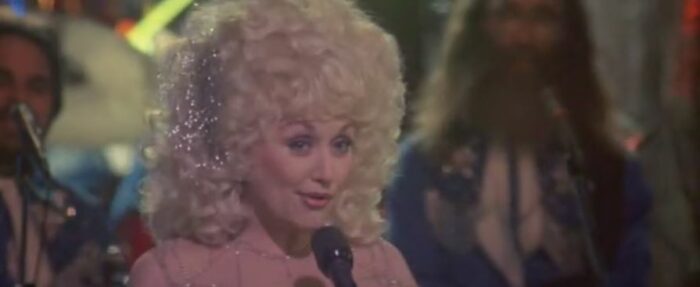
Like so many others, she was instead swindled by a walking slimebucket (this one’s named Freddie Ugo, who is played completely convincingly by Ron Leibman). Jake seems to have been conned into accepting a dead-end contract at the country bar known as the Rhinestone, where Ugo is the sleazy manager (fun fact: Ugo proudly wears a monogrammed jacket and has an apartment door with his initials on it. His initials are, of course, FU—get it? This is the level of humor that you should come to expect with Rhinestone).
The Rhinestone is known for its Amateur Talent Show, where Freddie presents the next “major new country-western singing sensation” that he thinks will make him a fortune. But there’s a catch: the audience is full of first-rate hecklers, making it damn near impossible for anyone who takes the stage to finish a song without the crowd turning against them.
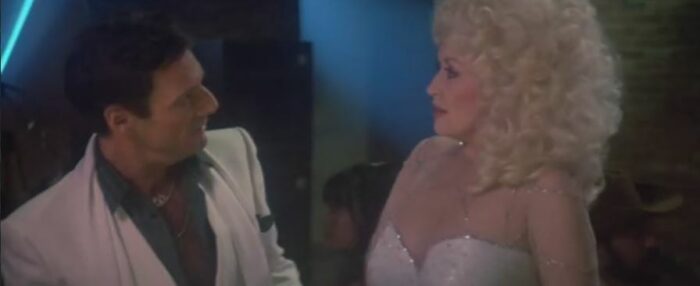
Amidst a scene of rapid-fire dialogue between Jake and Freddie, the plot is laid out in detail: Jake bets that she can turn anyone (but “no weirdos, no lepers, and no dead people”) into a country-western singer by getting them through one song without those “animals tearing him up alive.” If she wins, Freddie will tear up her contract. If she loses, “the contract stands, plus another five-year option.” And in case you forgot how much of a sleazeball Freddie really is, he adds, “and you sleep with me.”
Enter Nick Martinelli, the cabbie: a bumbling Italian stereotype of a man (Sylvester Stallone). Nick’s transformation from cabbie to country crooner is full of silly montages and contrived jokes, but it is not without its merits. Sure, Stallone is no singer, but his attempt at being a member of the Wild Possums band is a sight to behold.
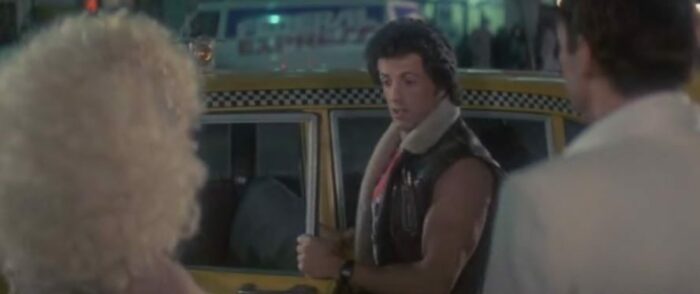
“Why don’t we just go sing a little?”: The Music
Parton was responsible for much of Rhinestone’s soundtrack and, while the film itself was critically panned and only made a fraction of its budget back, two songs from the film appeared on Billboard’s Country singles chart: “Tennessee Homesick Blues” and “God Won’t Get You.”
These certainly are quality songs by Dolly Parton. But there are two songs that are decidedly more memorable because, well, they are laughably bad (although for different reasons).
Nick’s first “official” singing performance takes places in Leipers Fork, TN, Jake’s hometown. She’s brought him here to teach him how to walk, talk, eat, and sing country. Dressed in an atrociously colorful suit and donning a hat with two raccoon tails hanging from it, Nick sings “Drinkin’stein,” a comical song replete with references to Frankenstein’s monster and none other than the King of Beers. Watch the scene of Stallone singing “Drinkin’stein” from Rhinestone and check out some of the lyrics below:
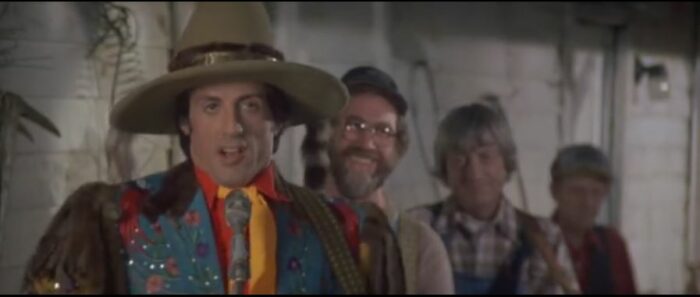
Budweiser, you’ve created a monster
And they call him Drinkin’stein
In the tavern down the street is the laboratory
Where he makes the transformation all the timeAnd a stein of Dr. Bud is just a pint of monster blood
And it does affect him different every time
The first “fresh meat” that we see during the Amateur Show at the Rhinestone is a man named Elgart (played by Rusty Buchanan; lyrics written by screenwriter Phil Alden Robinson [and maybe director Bob Clark]), a tougher-than-nails country singer who shows the crowd how serious he is by bending a microphone stand when they start to heckle him. He breaks out into a song that he wrote “for [his] baby.” Things start out strong: Elgart is a really good singer, and the crowd is pleasantly surprised with the first few verses. Watch the clip of “The Day My Baby Died” from Rhinestone and see the lyrics below:
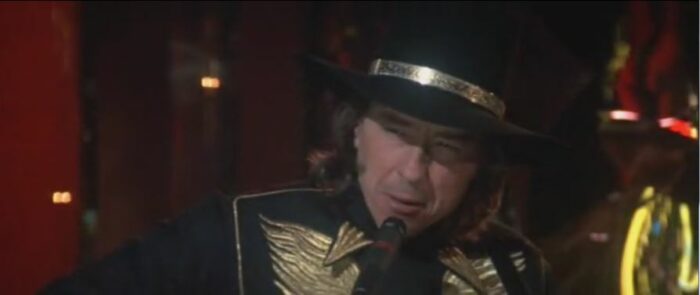
Well, I left my home when I was 22
But I never did find my time or place
It’s just the kind of thing a man has to do
With a scar on his soul, like the one on his face
And the emptiness inside
It was the day my baby diedIt was a Sunday June morning and the sun broke high
I had a smile on my face and I knew just why
Didn’t hear no warning, didn’t fear no storm
I knew for sure on that very morn
That girl was gonna be my bride
It was the day my baby died
In her long white gown and her bridal bouquet
How I begged her not to plow the fields that day
Though her beauty never stops
she felt a duty to her crops
She jumped in the old John Deere, and she drove away
Duty? The crowd looks around incredulously. Elgart continues:
She said, “Baby, don’t you worry,
this’ll only take a minute”
But the wheel caught her gown
and dragged her down in it
Imagine my surprise when I looked her in the eyes
Oh my God, I couldn’t believe it:
The tractor cut her down to size
The crowd has officially lost it.
Oh, how the hands of fate they cracked her
‘Neath the wheels of her daddy’s tractor
There was blood on the corn and brains on the hay
I ran as fast as I could, but all I found
Was chunks of my sweetie smeared all around
Big hunks of my darlin’ on the cold, cold ground
Oh…yeah
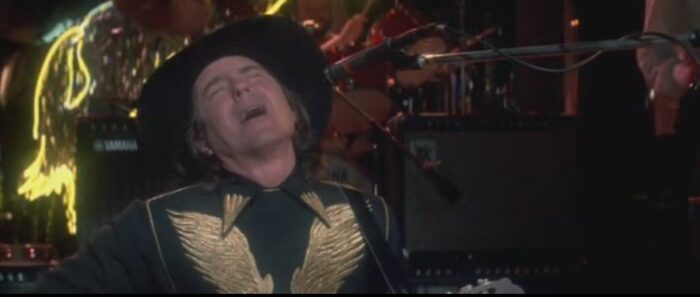
Elgart’s reaction to the crowd only adds to this hilariously tasteless and tragic moment: his look is one of sadness and confusion because, as he tells us after the song is over, “Hey, this really happened to my Loretta!”
“Lord, have mercy on a country girl…”: The Dialogue
Jake puts up with an obscene amount of sexual innuendo and harassment throughout the story: from her manager, from Nick, from Nick’s father (the funeral director), from her ex-fiancé.
The only “benefit” to this is that we get to see Jake hold her own: she’s just as fast to respond with a witty retort any time someone insinuates that she’s a stupid hillbilly sexpot. Take, for example, what she says to Freddie when he implies that she’ll have to sleep with him in order to get her contract back:
“There are two kinds of people in this world, and you ain’t one of ‘em!”
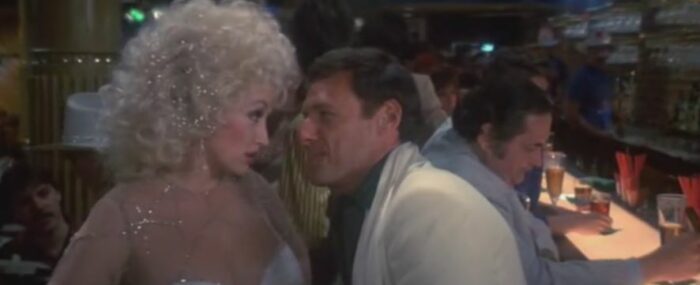
The banter between Jake and, honestly, any character is why you should watch Rhinestone. Parton is a delight to watch in any scene, but any time she delivers a zinger to a sleazy dude is reason enough in itself. I may not have understood all of the implications of some of the dialogue as a kid. What I did understand was that here was this beautiful, assertive woman who didn’t take any shit from anyone—not her boss, not some creepy rando, not anyone.
Today we can continue to argue over whether this makes her a feminist; a label Parton herself rejects.[3] But, I think to quibble over labels misses the point here: Parton’s Jake is so much more than a two-dimensional female character whose sexuality drives much of the plot. She’s a badass woman who showed a kid how to be a fighter (and how to throw a good punch).
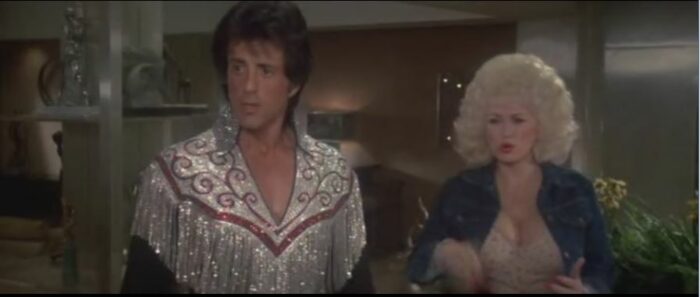
[1] The audience response during test screenings was said to be so bad that they decided to edit in scenes of another character (Lt. T. M. Landry, played by Eddie Murphy) to try to improve the movie, leading Murphy to be listed as a “strategic guest star” on some of the film’s posters. It apparently still didn’t help.
[2] Stephen Miller, Smart Blonde: The Life of Dolly Parton (London: Omnibus Press, 2008), 214. Though Weiss had written and performed the song back in 1974, it was Glen Campbell’s 1975 rendition that brought the song acclaim.
[3] See the latest conversations about Jad Abumrad’s podcast, Dolly Parton’s America, where he asks her if she identifies as a feminist.


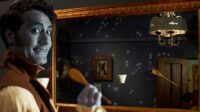

Love this movie. It’s just so ridiculous you can’t take it seriously, just enjoy the silliness